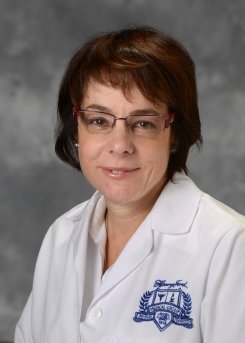Molecular Therapeutics Laboratory
High-grade gliomas are the most prevalent and aggressive central nervous system tumors in adults. Despite aggressive treatments — such as maximal surgical resection, radiation and DNA-alkylating agents — these tumors often recur and have a poor prognosis. Our team is dedicated to developing a robust pre-clinical therapeutic program aimed at validating new therapeutic targets and combination strategies to treat high grade gliomas.
The Hermelin Brain Tumor Center at Henry Ford Hospital in Detroit hosts one of the world's largest brain tumor biorepositories. A significant portion of the samples analyzed by The Cancer Genome Atlas (TCGA) low-grade glioma and glioblastoma projects have come from our repository. Leveraging this valuable resource, our lab has developed a panel of cancer stem-like cells derived from freshly resected high-grade gliomas, capturing the key genomic abnormalities typically observed in the clinic. These cells are used for in vitro studies and for establishing patient-derived orthotopic tumor xenografts in mice (PDX).
In high-grade gliomas, focal genomic amplification is the most common mechanism for oncogene activation. Notably, our recent research has revealed that these oncogene amplifications often occur in extrachromosomal DNA rather than within the chromosomes—a feature that is preserved in our patient-derived models. This discovery has significant implications for understanding tumor evolution and therapeutic response (deCarvalho et al., Nature Genetics, 2018). Using our patient-derived models, we are investigating the effects of targeting oncogene drivers activated by extrachromosomal amplifications using pharmacological agents currently in early-phase clinical trials. Additionally, we are exploring a novel therapeutic strategy that targets a prevalent DNA repair pathway, potentially disrupting the formation of oncogenic amplicons. The integration of treatment efficacy measurements with dynamic changes to the omics landscape in our pre-clinical platform generates critical data that cannot be obtained in the clinical setting. This supports the optimization of the treatments for patients with brain tumors.
Our work has been supported by the Department of Defense, the Canadian Institutes of Health Research, pharmaceutical companies, philanthropy, and institutional funding.
Principal Investigator
Ana C. deCarvalho, PhD

Associate Scientist
Dept. of Neurosurgery
Henry Ford Hospital
Associate Professor – Research
Dept. of Physiology
College of Human Medicine, Michigan State University
Adjunct Assistant Professor
Departments of Oncology and Pharmacology
Wayne State University School of Medicine
Email: adecarv1@hfhs.org
Research Interests
- Brain tumor patient-derived models
- Tumor evolution, mechanisms of resistance to therapy, target validation, and development of novel therapeutic strategies for high-grade glioma
- Oncogene amplification
- Developmental programs aberrantly activated in high-grade gliomas as key drivers of plasticity, transient cancer stem cell phenotype and drug resistance
Current Lab Members
- Kevin Nelson, M.S., Research Lab Associate V
- Laura Hasselbach, Research Lab Associate IV
- Susan Irtenkauf, A.A.S., Team Leader-Research Lab
- Bart Thomas, Research Lab Associate IV
- Yuling Meng, Ph.D., Research Lab Associate IV
- Simona Cazacu, M.D., Research Lab Associate IV
- Artem Berezovsky, Ph.D., Postdoc
- Andrea Transou, HT (ASCP) QIHC, Histology Core Coordinator
- Kristyn Quenneville, M.S., Histotechnologist, Histology Core
- Tolani Sogbesan, Med-Direct BS/MD Scholar, Wayne State University
.svg?iar=0&hash=F6049510E33E4E6D8196C26CCC0A64A4)

/hfh-logo-main--white.svg?iar=0&hash=ED491CBFADFB7670FAE94559C98D7798)